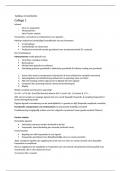INHOUDSOPGAVE
Introduction ................................................................................................................................. 4
The concept of comparative law ....................................................................................................... 4
The research object ....................................................................................................................... 4
research method.............................................................................................................................. 9
components.................................................................................................................................. 9
Comparative Law v. Legal History Methodological similarities ....................................................... 10
SOCIOLOGY, ANTHROPOLOGY, LEGAL THEORY .......................................................................... 11
Origins and development ............................................................................................................. 12
Antiquity (pre 500): only a few traces of ‘comparative law’ .................................................................12
1st half of the Middle Ages (500-1000): little to be found ....................................................................13
2nd half of the Middle Ages (1000-1500): important, but different concept from present .....................14
General overview ......................................................................................................................... 14
Rediscovery and Influence ........................................................................................................... 14
Legal perspective ........................................................................................................................ 15
THE ‘NEW AGE’ (1500-1800) ............................................................................................................16
general overview ......................................................................................................................... 16
legal evolution ............................................................................................................................. 18
sporadic legal comparison ........................................................................................................... 19
19th Century: CL ‘taking roots’ – a systematic approach....................................................................19
legislative comparison ................................................................................................................. 20
scientific comparison .................................................................................................................. 21
From 1900 onwards: a ‘blossoming’ comparative law in a contemporary sense .................................22
Birth of modern comparative law.................................................................................................. 22
The Interwar era .......................................................................................................................... 23
Second Half of the 20th Century to Today ..................................................................................... 23
Applications ................................................................................................................................ 24
Comparative law in conflict resolution .............................................................................................24
Comparative law & international law ............................................................................................ 24
Comparative law & international private law ................................................................................. 26
Comparative Law and the Application of Foreign Law .................................................................... 28
COMPARATIVE LAW IN LAWMAKING ................................................................................................29
Comparative Law and Lawmaking ................................................................................................ 29
Comparative Law in Case Law ..................................................................................................... 30
Reception and Legal Transplants ................................................................................................. 33
Harmonization and Unification..................................................................................................... 35
Comparative Law in Legal Scholarship (Research Method) ................................................................45
Denscombe - The Logic of Research Proposals ............................................................................. 45
Research Design ......................................................................................................................... 46
Originality of the Research ........................................................................................................... 46
Normative Legal Studies and Comparative Law ............................................................................ 47
1
,Comparative Law UGent 2024-2025
Role of Comparative Law: ............................................................................................................ 47
Positive Legal Research ............................................................................................................... 47
Positive Legal Doctrine and Comparative Law ............................................................................... 49
Comparative Law as a Data Collection Method ............................................................................. 49
Didactic Value of Comparative Law .............................................................................................. 49
Conclusion on Comparative Law.................................................................................................. 50
Microcomparison ........................................................................................................................ 50
COMPARABILITY OF LEGAL SYSTEMS ..............................................................................................51
Choice of Systems to Compare .................................................................................................... 51
Comparability and Basis for Comparison...................................................................................... 51
APPROACH: DOGMATIC VERSUS FUNCTIONAL COMPARISON.........................................................52
Dogmatic Legal Comparison ........................................................................................................ 52
Functional Legal Comparison ...................................................................................................... 53
The Presumption of Similarity....................................................................................................... 53
Functional vs. Dogmatic Comparison: Pros and Cons ................................................................... 53
KNOWLEDGE OF FOREIGN (LEGAL) SYSTEMS ..................................................................................54
Law versus Doctrine .................................................................................................................... 54
Law and/as Language ......................................................................................................................57
LAW AND LANGUAGE .................................................................................................................. 57
Sources of Law ...............................................................................................................................59
FORMAL SOURCES OF LAW ......................................................................................................... 59
LEGISLATION .............................................................................................................................. 60
CASE LAW ................................................................................................................................... 60
THE RELATIONSHIP BETWEEN THE JUDGE AND THE LAW ............................................................. 61
THE ACTUAL COMPARISON.............................................................................................................64
Macrocomparison ....................................................................................................................... 65
Definition of Macro-Comparative Law ..............................................................................................65
Utility of Macro-Comparative Law ....................................................................................................66
Methodological Fundamental Issue .................................................................................................67
The Concept of a Legal System..................................................................................................... 67
Fundamental Issue of Taxonomies ............................................................................................... 68
Criteria for Taxonomy/Typology ........................................................................................................69
External Factors .......................................................................................................................... 69
Level of Development .................................................................................................................. 69
Genealogical Approach ............................................................................................................... 70
Typological Approach .................................................................................................................. 71
COMMON LAW VS. CIVIL LAW (Ideal-Typical) ...................................................................................73
Romanization .............................................................................................................................. 73
Substantive Law .......................................................................................................................... 73
Rules .......................................................................................................................................... 74
Rule-Making ................................................................................................................................ 74
Summa Divisio ............................................................................................................................ 74
MIXED SYSTEMS, HYBRID SYSTEMS, AND LEGAL PLURALISM ...........................................................75
2
,Comparative Law UGent 2024-2025
Unique Mixed Systems ................................................................................................................ 76
Law as Culture and Decoloniality ................................................................................................. 77
Study Materials ...............................................................................................................................77
Law as Culture: Intellectual Origins ..................................................................................................78
Philosophical Roots..................................................................................................................... 78
Phenomenology .......................................................................................................................... 78
Psychoanalysis ........................................................................................................................... 78
2.4 Critical Theory ....................................................................................................................... 78
Comparing Law as Culture ..............................................................................................................79
A Critique of Objectivity in Law .........................................................................................................79
Remnants of Colonialism ................................................................................................................79
Hybridity and Peripheral Identity .................................................................................................. 79
The Case of Egypt’s Civil Code ..................................................................................................... 79
Cultural Expressions and Law ..........................................................................................................79
Grounding Law in Cultural Philosophy ..............................................................................................80
Law and Decoloniality .....................................................................................................................80
Decolonial Critiques .................................................................................................................... 80
Key Themes................................................................................................................................. 80
Concluding Insights.........................................................................................................................80
Comparative Law and Interdisciplinarity ...................................................................................... 81
Thinking as a Lawyer ........................................................................................................................81
Legal Alienation ........................................................................................................................... 81
Bourdieu’s Sociology of the Legal Field ......................................................................................... 81
Law and Ideology ............................................................................................................................82
The Ideological Function of Codes................................................................................................ 82
Freedom and Constraint in Adjudication....................................................................................... 82
Comparative Law and Cultural Studies .............................................................................................82
Defining Culture (CESCR GC 21) .................................................................................................. 82
Law as Cultural Expression .......................................................................................................... 82
Legal Rigor and Authenticity .............................................................................................................82
Material Authenticity ................................................................................................................... 83
Heritage Conservation in Law....................................................................................................... 83
Comparative Law and Politics ..........................................................................................................83
Law as Political ........................................................................................................................... 83
The Influence of Politics ............................................................................................................... 83
Instrumentalization of Comparative Law ..........................................................................................83
Colonial Applications .................................................................................................................. 83
Criminology’s Role in Law ................................................................................................................84
Criminology and Interdisciplinarity ............................................................................................... 84
Historical Development ............................................................................................................... 84
Criminology’s Contribution to Law ............................................................................................... 84
3
, Comparative Law UGent 2024-2025
8. Concluding Insights .....................................................................................................................84
COMPARATIVE LAW
INTRODUCTION
THE CONCEPT OF COMPARATIVE LAW
Comparative Law - What is it not?
• It is not a branch of law or a part of the law (objective law).
• It is not a claim or authority (subjective law).
• It is not a way to resolve conflicts (functional law).
What is it then?
• It is an activity in which someone engages with the law, namely, a research method and a way to
study the law.
o Zweigert and Kötz were considered the standard reference, but no new work has yet
replaced it.
• It is a comparison of laws, where comparison is the method and the law is the object (“an
intellectual activity with law as its object and comparison as its process”).
Note: Some terms are misleading.
• "Comparative law" = comparable law.
• "Droit comparé" = compared law
THE RESEARCH OBJECT
WHAT IS LAW?
The Object of Comparison = Law - Importance of the Question
• One must know what law is, because otherwise, one cannot compare it, and it will yield no
results.
• Law = "a set of rules for ordering society" (a vague description).
o This is not a true definition of law, as it does not explain what rules are or what ordering
means. It does not teach how to distinguish behavioral rules from legal rules.
4











